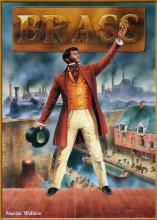Brass
In Brass the players represent industrialists in northern England during the hay-day of the industrial revolution. Each player needs to build an economic engine that surpasses the other by the time railways are established and the foreign markets have been saturated with English cotton.
The goal of the game is to have the most points at the end of the game. These are obtained in three ways:
1) Building industries and having them successfully utilized
2) Building canal or rail connections to cities that have many successfully utilized industries
3) money at the end of the game (very inefficient).
Game play is divided into two phases - the Canal Phase and the Rail Phase. At the beginning of each phase players are dealt a hand of cards that represent a mix of the cities and the available industries.
On his turn, a player has two actions (except first turn of the game where there is only one action) and must spend a card for each one. Available actions include:
1) building an industry
2) building a connection [either canals or rails based on phase of the game]
3) develop their own industries which removes lower victory point industries from a player's board in favor of higher victory point ones
4) sell cotton
5) take a loan (absolutely necessary a few times a game.
At the end of a player's turn they replace the two cards they played with two more from the deck. Turn order is determined by how much money a player spent on the previous turn - from lowest spent first to highest spent. This turn order mechanic opens some strategic options for players going later in the turn order allowing possibility of back-to-back turns.
After all the cards have been played the first time (deck size adjusted for number of players) the Canal phase ends and a scoring round commences. After scoring, all canals and all of the lowest level industries are removed for the game, new cards are dealt and the Rail Phase begins. Rail phase is identical to Canal Phase except players may now occupy more than one location in a city and a double connection build (though expensive) is possible. At the end of the Rail Phase there is another scoring round and a winner is crowned.
The use of the cards limit where you can build your industries but any card can be used for the develop, sell cotton or building connections actions. This leads to a strategic timing/storing of cards. Resources are common so that if one player builds a rail line (which requires coal) they have to use the coal from the nearest source which may be an opponent's coal mine which gets that coal mine closer to scoring (i.e. being utilized).
[Side Note]
Brass provides a game of timing and positioning yourself to have your opponents propel you victory. The rule book is notorious for being difficult to understand (though has been significantly fixed in the most recent edition). After a few turns the game reveals itself to being far more simple than the rules suggest. A teacher or viewing a how to play video is definitely worth the time.

